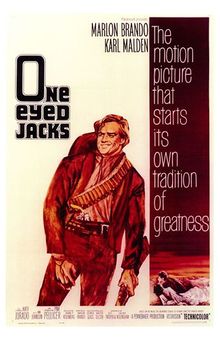
ONE-EYED JACKS
US, 1960, 141 minutes, Colour.
Marlon Brando, Karl Malden, Pina Pellicer, Katy Jurado, Ben Johnson.
Directed by Marlon Brando.
One- Eyed Jacks is a Marlon Brando western. He worked on the project for many years during the late 50s and eventually the film was released in 1961. He directed it himself, the only film that he has directed. Many writers worked with him on the project, including Stanley Kubrick for about six months. The film is an intense kind of western. Brando is very effective as is Karl Malden as the villain. It is also different in the coastal locations that it uses making for an intense beauty as well as ruggedness. There is an irony in the title, and the theme of gambling and luck. The film probably relates in themes to many of the westerns made in the late 60s and early 70s with the vengeance theme. It is an impressive enough western in itself, but of great interest because of its place in Marlon Brando's career.
1. Was this an enjoyable western? What western conventions did it use? What differences were there? The emphasis on action, psychology, symbolism?
2. Marlon Brando as star and director? How clearly was this his film? The significance of the title and its reference to the knaves on cards with their one eye? Their confrontation?
3. The contribution of colour, the Mexican scenery, the Monterey locations, the town and especially the sea?
4. How was Rio the focus of the film? His presentation at the opening, with the banana, the emphasis on close-ups of him, his work as a robber, his trust in Dad, becoming a victim and pursued, the effect of prison on him? The motivation of vengeance. of cruelty, his lies to the women and especially to Louisa, his humiliating them, his being humiliated by Dad? What capacity for love, hate? The final revenge?
5. How much sympathy could the audience have for Rio as a person? What characteristics were likeable? What actions and characteristics were repellent? How complex a character was presented?
6. How interesting a villain was Dad? The initial good humour and sympathy for Rio, audience disgust at his betrayal, at his escaping prison? The effect of his hypocrisy in settling down and becoming Marshal? The credibility of his self-protection, distrusting Rio. hating him getting his gun away? His suspicions about Louisa? The cruelty and sadism of the whipping and hand crushing? The significance of his empty celebration of the Fiesta? The irony of his death? The significance of Dad as a western character?
7. The balance of Louisa for the film? How attractive a girl in herself, her strengths, relationship to Dad and her mother? Her attraction to Rio, the sequence of the lies. especially with the necklace (audience previous preparation for this?) Rio's seducing her. her letting herself be seduced? The motivation of her helping him? Louisa as a heroine for this film? Audience softness and sentiment in her regard contrasting with Rio? Louisa and her relationship with Dad? Her confiding in her mother and her mother taking her side? Her importance for the end?
8. The character of Maria: as a support for Dad, her love for him, her sympathy for Louisa. finally being repelled by Dad?
9. The importance of the Deputy and his sadistic taunts and clashes with Rio? As a mirror of Dad? The role of Louisa in this?
10. Amory and Johnson: typical robbers, helping Rio, their reactions to his whipping, their going ahead with the robbing, the shooting of Modesto, their deaths? The typical fate of bank robbers?
11. Modesto and his loyalty to Rio? The significance of his death for Rio?
12. The importance of the Mexican sequences in setting the scene: the robbery, the pretence of love, the Mexican people, the scenery and being lost in the mountains of Mexico. the drama of the chase? The effect of the myth of the wild west on audience response to this?
13. The dramatics of the capture, betrayal, pretence at forgiveness, revenge? What insight into the motivations of revenge did the film offer?
14. Monterey as a western town, a place for these characters, as ruled in justice by Dad? The sequence of Rio shooting the bully and its effect on the people?
15. The symbolism of violence: the guns and shooting, the whipping, the bashing of the hand, the final shooting in the back?
16. The contrast of the feast with the drinking, the dancing, the joy, the letting go of inhibitions?
17. Themes of power, law, cruelty?
18. Audience reaction to the final shoot-out and the manner of Dad's death?
19. How well did the film combine the cruel strand centred on Louisa?
20. Was this a successful psychological western, the use of symbols, myths and the criticism of myths, sentiment, realism - is this an adequate picture of the complex west?